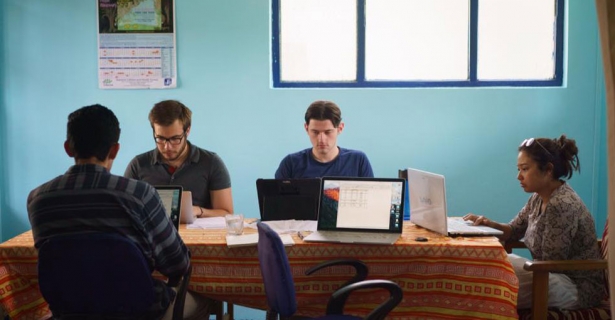“They make a devastation and call it peace” - Agha Shahid Ali
Trauma has been woven deep into the fabric of Kashmiri society. Even in a seemingly calm period, triggers of trauma appear before the onlooker on a casual basis. Pavements lined with barbed wires, armored army vehicles between trucks of chicken and auto-rickshaws, and military camps with grenade-proof walls are not unusual sights. The people of Kashmir are stuck in a world that not only inflicts onto them frequent bursts of physical violence, but also implies historical and future violence on a daily basis.
Trauma, when left unresolved, breeds more trauma, material and mental. Resolving the problem in its most material sense, unfortunately, seems improbable. Many Kashmiris I’ve met demand freedom and autonomy. A 16-year-old friend concluded his long-winged speech with “We want freedom, but that doesn’t seem possible. So I just want peace.” Some want the promised plebiscite. There are graffiti that champion Pakistani rule around Old City. In this constant stream of personal and political negotiations, a single approach to appease everyone seems out of reach.
Justine’s work, fortunately, does not attempt to come up with a answer for the political circumstances of Kashmir, but rather, tries to ensure that the cognitive mechanisms of the people of Kashmir are functioning optimally as they try to find answers themselves. A haunting past, the sense of impending danger, and anxieties over a stolen future keep pressuring both the societal and personal psyche, making the Kashmiri exceedingly susceptible to mental health issues. When the mind is having difficulty with even a just-functioning state, discussions on long-term solutions are eclipsed by the needs of immediate-survival.
The 2015 report by Médecins sans Frontières states that 45% of the adult population in Kashmir experience mental health problems. A person with PTSD, stuck in a perpetual state of “fight-or-flight,” will find it difficult to distinguish threats from non-threats and have a very altered understanding of the choices they have. A person living with major depressive disorder may not even find the strength to make a choice. Through the mental maelstrom and the raging realities of conflict, this simple and profound statement often goes unpronounced: I have a choice.
The post-conflict generation was birthed into trauma. Having only experienced the world in a state of conflict, it is not unlikely for a Kashmiri boy to believe that his only choice is stone-pelting. This statement does not aim to invalidate stone-pelting as a method of resistance, for it is indeed a very powerful and mobilizing one. Nevertheless, for a child who grows up to stories of freedom fighters, witnessing the violence by the hands of the military and the futility of an education due to high levels of unemployment, partaking in the militant resistance can become the only way of adding meaning and purpose to his life.
With this in mind, we’ve been working with Healing Kashmir on a proposal for a preventative mental health program in schools. The program aims to provide youth with an understanding of how minds function, encourage good mental hygiene, and give them the tools to address and resolve their anxieties, which if left unattended can compound to clinical levels in adulthood. This initiative hopes to not only to reduce to prevalence of mental disorders in future generations through strengthening mental resilience, but also to break the monopoly hopelessness has on the youth of Kashmir.
Through my experiences so far, I’ve realized the ease with which one can fall victim to the idealist dream of an “end-all-be-all” solution, especially in the comfort of being a non-victim. It is naïve, yet very easy, to assume that a program that will help youth cope with their stressors more effectively will enable them to be more autonomous, will encourage them to stay in school, will invigorate the entrepreneurial spirit in Kashmir and will in turn provide a more stable economy and higher employment rates. It is almost as naïve to claim that resolving anxieties in their natal states will deter militancy. No singular solution will bring about complete peace and calm, and no singular program will redeem the traumas of living under years of conflict. These initiatives are steps.
Progress is a process.

